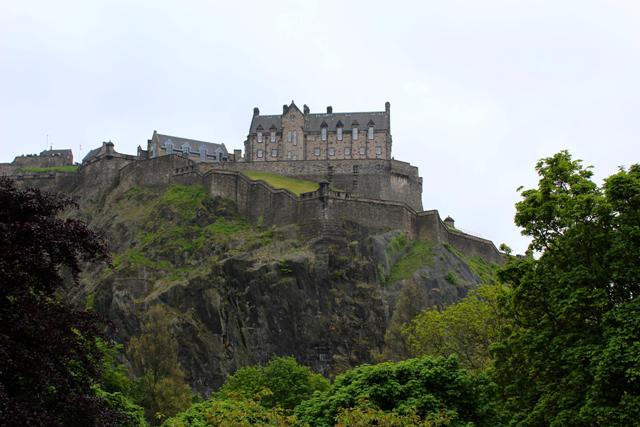By Tom Robotham
The traveler sees what he sees. The tourist sees what he has come to see.
The first time I visited England, in 1979, most of the people I encountered were British. That may seem like a terribly obvious statement. But during a visit to the United Kingdom late last month, I was struck by how much had changed. I’d visited London one other time since, in 1999, and by then McDonald’s and other symbols of American culture had started to pop up. Now they are ubiquitous. Starbucks cafes, in particular, seemed to be on every street corner in the bigger cities. I had no interest in patronizing any of them (I don’t even go to Starbucks in the States), but I would be willing to bet that few if any of them were staffed by Brits because even the traditional English pubs are now run by and large by young people from Eastern Europe and elsewhere. For a few fleeing moments, this saddened me. I’d gone to England, after all, not only to see the sights but to meet English people. I suppose you could say that the presence of these immigrants violated my romantic sensibilities, which had been brightened on my flight over by my re-reading of my favorite Victorian novel, Middlemarch.
As I soon learned, many Brits feel this way as well. The most prominent story in the newspapers and on BBC television newscasts was the controversy over an upcoming vote on the question of whether or not the UK should leave the European Union. The issue will be decided on June 23. Judging by a number of conversations I had in various pubs throughout the country, I’d be willing to bet that voters will support the idea of remaining in the EU. One middle-aged man I talked to in Stratford said he thought that leaving the EU would be “disastrous” for the economy. Another person—a young woman in Leicester—said she was “on the fence,” but leaned toward voting to remain a part of the EU.
“I’m just here by accident of birth,” she said, “and I realize how lucky I am. I love it here. The people who are coming here now from other countries are just trying to better their lives.”
It’s not as if the international flavor is entirely new, of course—especially in mid-sized cities like Leicester, not to mention the larger cities of London and Edinburgh, which I visited as well. One friend of the aforementioned young woman was Trish, whose mother is Indian and father Kenyan. She was born in Leicester, and is every bit as British as her purely Anglo friend.
But times are changing. A headline in The Daily Mail—one of the sensationalist tabloids—screamed, “Record Number of Jobless EU Migrants in Britain.” The resentment toward these immigrants among working class English people was palpable among people interviewed by BCC reporters.
“Take your yuppie values and go back to London,” yelled a Cornish fisherman on one newscast I saw, as he addressed a man who was campaigning on the side of staying in the EU. The belief is that immigrants who have found jobs are taking work opportunities away from native English, and that those who come to the country without work are taxing the system by enjoying Great Britain’s broad social services. The anti-immigrant feeling was strikingly similar to the widespread feeling here in this country—a sentiment that I oppose. Nevertheless, it did strike me as a bit arrogant to dismiss the feelings of the Cornish fisherman and likeminded Brits as nothing more than xenophobia. Change—especially for people who are steeped in tradition—isn’t easy to accept with a shrug.
None of this directly affected me, of course. For me, as I said, it was simply a matter of surprise to see so many Eastern Europeans dominating the service and retail industries. I realized very quickly, however, that I was thinking like a small-minded tourist, wanting to see what I had come for rather than seeing things simply as they are.
At any rate, this feeling was soon overwhelmed by a more positive impression: Virtually everyone I encountered—British-born or not—was extremely friendly, from the lovely British couple that owned the charming Swan Hotel in a small town called Upton on Severn in the Cotswolds region, to a young woman from Greece who moved to the UK just six months ago and is now working 12-hour shifts a pub in London. At another pub—The Punch Tavern on Fleet Street, named for the famous satirical magazine—the Eastern European manager overheard me asking about the pub’s history and brought me a flier that explained it all in great detail. From start to finish—from Oxford to Edinburgh to London—I was deeply moved by the warm hospitality.
There were some signs of change that bothered me. Among them was a trend in the pubs. Good English ales are still widely available, and I took full advantage of this. But many of the English customers seemed to prefer their beer American-style. Worst of all, virtually every pub offered Guinness ice-cold, a practice that I regard as nothing less than a crime against humanity. That, I should add, is not a romantic notion of mine but simply a matter of good taste. Guinness was not made to be served ice cold; it kills the flavor. But of course for many Americans, ice-cold is the only way to serve beer of any kind, and many younger Brits now seem to have adopted this notion as part of their fascination with American ways. They have become fascinated as well with the American “craft beer” movement, which is ironic, to say the least, because English ales are among the original “craft beers.” By and large, though, it’s not English ales that they seek; it’s “IPAs.” In several pubs I visited, I overheard young customers not only from America but from Germany and elsewhere asking the bartender if they had an “IPA.” I’d be willing to bet that these customers had no idea what IPA even stands for. Drinking IPAs is just the thing to do these days, here and abroad, apparently. I have nothing against them, but why, I wonder, would a person want to go to a foreign country and not enjoy the local ales as well as the local food.
Ah, yes, the food. It is a stereotype, needless to say, that English food is worse than bland, but I thoroughly enjoyed every meal of steak and kidney pie, fish and chips and other traditional dishes. Whenever I ordered the fish I was astonished to find placed before me an entire cod, not just a few small pieces that one inevitably receives here when ordering fish and chips. The cod was also delectably fresh and meaty—so much so that I’m going to have a difficult time ordering fish and chips once again in local establishments.
It was gratifying to see that this tradition has been sustained. More gratifying still was the preservation of deeper histories. They are reflected in the many tourist attractions, of course—notably Westminster Abbey, where I encountered with reverence the tombs of Elizabeth I and Geoffrey Chaucer, among many others. In Leicester Cathedral I was equally moved by the new tomb of Richard III, which was constructed just last year after his remains were discovered at a nondescript spot nearby and moved to that more sacred place. In Stratford Upon Avon, of course, I visited the house where Shakespeare was born, and in London, the new Globe Theater, a lovely replica built just a few hundred feet from the site of the original Globe. While there I happened to catch a marvelous production of The Taming of the Shrew, and as the actress playing Kate delivered her final monologue I was moved to tears, not only by the power of her acting but by the fact that I was experiencing it on the floor, just 15 or 20 feet from the stage, as a commoner would have back in Shakespeare’s time.
And yes, in spite of the ice-cold Guinness and presence of other bland beers produced by multinational corporations, the sense of history remains alive and well in the pubs, many of which were founded when Shakespeare was still alive. In Stratford, in fact, I enjoyed a few pints at a pub that dates back to the late 1500s—an establishment that Shakespeare himself might well have frequented.
Pondering the EU question, it occurred to me that this reverence for history and tradition may be a part of the “Vote Leave” sentiment. If so, it differs markedly from the anti-immigrant sentiment in the United States. Our own country, after all, was built on immigration, and the idea of change lies at the nation’s very essence. Our monuments, and historic towns like Williamsburg notwithstanding, Americans have never really cared much about history. Our sentiment in this regard is summed up in Henry Ford’s famous comment that “history is more or less bunk. It’s tradition,” he added. “We don’t want tradition. We want to live in the present, and the only history that is worth a tinker’s damn is the history that we make today.” The British, by contrast, have always cherished their traditions.

(Tom Robotham atop Croft Hill, Leicestershire, which overlooks the granite quarry where his grandfather used to work.)
A mindless clinging to tradition is indeed shortsighted. Change brings developments both good and bad, but it is inevitable. Still, I’m glad that in England and Scotland, history is not to be confined to museums but remains a part of everyday life, even as Starbucks and ice-cold Guinness become ever more popular. It is the very rock on which our civilization was built, as I became acutely aware as I stood on a hill overlooking the old granite quarry where my grandfather worked as a young man in Leicestershire. As I walked back down the hill I picked up a small piece of granite lying in on the path as a reminder of this. I bought many souvenirs as well during the course of my journey, but this stone will forever remain the most cherished among them—a reminder of my personal roots as well as the collective history that shapes us all. This history is more than a subject of fascination. When properly embraced, it has the power to sustain us as the winds of change continue to buffet us. And I, for one, am grateful to have been reminded of this.




